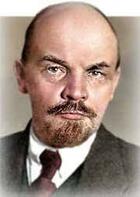
Vladimir Ilich Uliánov (in Russian, вадимир иьич унов, Romanization vladimir il'ič ul'janov, pronunciation about this sound [vlɐˈdʲimʲɪr ɪˈlʲitɕ ʊˈlʲanəf] (? Apriljul./ April 22, 1870greg.-Gorky, January 21, 1924), was a Russian politician, revolutionary, political theorist, philosopher and communist leader. Leader of the Bolshevik sector of the Russian Social Democratic Labor Party (RSDLP), he became the main leader of the October Revolution of 1917. In 1917, he was appointed president of the Council of People's Commissars (Sovnarkom), becoming the first and highest leader of the Union of Soviet Socialist Republics (USSR) in 1922. Politically Marxist, his contributions to Marxist thought are called Leninism, or better known as Marxism-Leninism, a socialist ideology that would spread throughout most of the "communist bloc" and in the "second world" during the Cold War.
He militated since his youth in the revolutionary political left. During his university studies he was arrested and exiled for three years in Siberia. He then fled to various countries in Western Europe, and went on to become a leading party theoretician. In 1903, he played a key role in the RSDLP schism, becoming the leader of the Bolshevik faction, as opposed to the Menshevik faction led by Yuli Martov. He returned to Russia for a short time on the occasion of the Revolution of 1905. In 1914, with the outbreak of the First World War, he began to campaign to transform the war in Europe into a revolution of the entire proletariat.
He was the main Bolshevik leader of the October Revolution of 1917. Already in power, Lenin proceeded to apply different reforms that included the transfer to the State or to the Soviet workers of the control of properties and lands in the hands of the aristocracy, the old crown or landowners. Facing the threat of invasion by the German Empire, he signed a peace treaty that led to Russia's exit from World War I. In 1921, the government of Lenin established the New Economic Policy, which combined socialist and capitalist elements and which began the process of industrialization and recovery of the country after the Russian civil war, a harsh conflict that included the participation of fourteen foreign nations against the new Soviet state.
After his death in 1924, Leninism gave rise to various schools of thought, including Marxism-Leninism and Trotskyism, of Stalin and Trotsky respectively, who fought for power in the USSR, both declaring themselves more faithful of Marx and Lenin than the other. Communism became an ideology that had hundreds of millions of followers throughout the world during the 20th century and whose approaches were put into practice by numerous countries, competing for global supremacy with the capitalist system. Lenin continues to be a highly controversial and manipulated figure. He had a very significant influence within the international communist movement and is considered one of the most prominent and influential figures of the 20th century.





